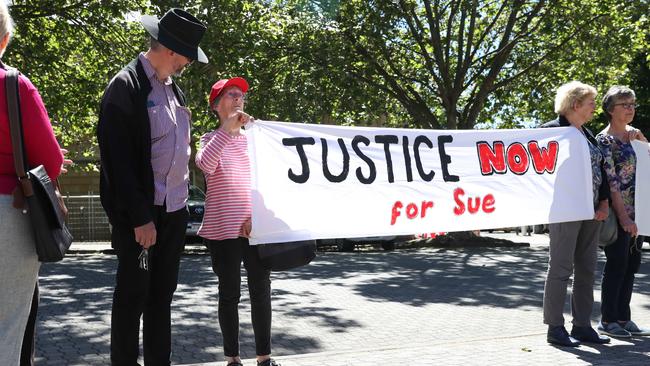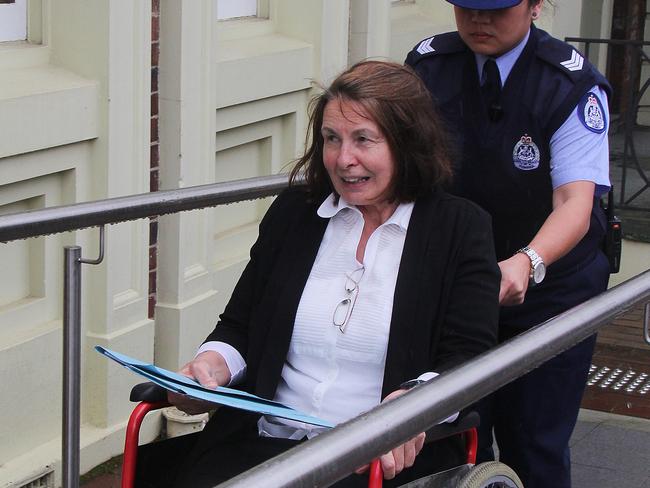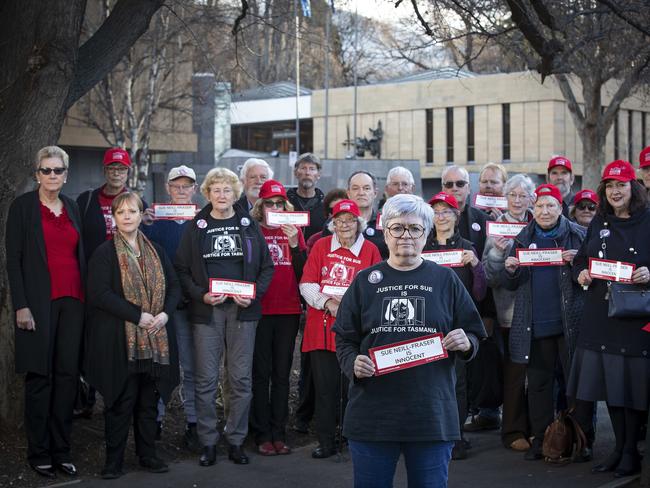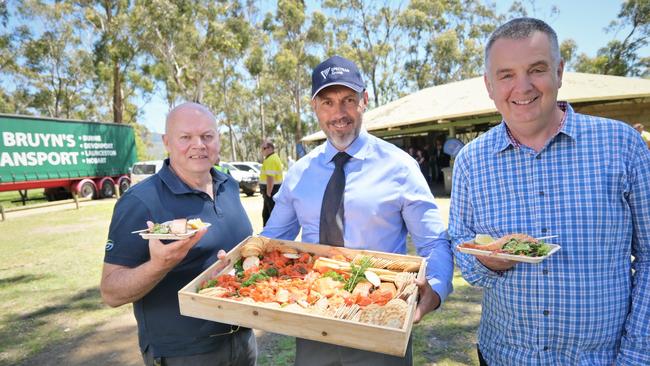Charles Wooley: Am I becoming Eric Abetz?
Clearly the games will go on. And realistically if Joe isn’t there, dozing off in the stand, does it matter a jot, writes Charles Wooley.
Opinion
Don't miss out on the headlines from Opinion. Followed categories will be added to My News.
I feel as if Eric Abetz and I go a long way back though we scarcely know each other. We have never broken bread and never even had a drink. Nor have we ever spoken outside of a radio or television studio.
That might’ve been because it always seemed one of us was on the wrong side of history.
But something strange is up.
Either Eric is drifting, or I am.
More and more I find Eric making pronouncements with which I agree: such as this week when, like some respected elder statesman of the Liberal Party, he arose to call on the government to “follow America’s lead” on the diplomatic-level-boycott of the Beijing Winter Olympics.
He called for Australia to standup against, “China’s egregious human rights abuses.”
The Tasmanian Liberal Senator, recently dumped to the almost unwinnable number three position on the Liberal ‘ticket to ride’, was the first in his party to applaud President Biden’s decision not to officially attend the China Winter Olympics.
He described Biden’s action as “a most welcome move and one in that Australia must follow suit.”
Abetz declared “Australia must not be complacent but move with speed to demonstrate our long commitment to upholding human rights and calling out where they are breached.”
I worry that I might have said those same words. Though not with quite the same tortured syntax.
But it is this very ‘Abetzian’ turn of phrase which convinces me this is indeed the same Eric who years ago denounced me as being “xenophobic” when I wrote that selling our biggest dairy farm to the Chinese was not a good idea.
I reckon he has changed his mind since then.
And why not?
John Maynard Keynes, the great economic advocate of governments printing money and spending whatever it takes to get out of trouble, reckoned changing your mind is always good. “When the facts change, I change my mind,” Keynes explained.
Eric this week was certainly ringing the changes and championing human rights while straining the English language: “By, in a diplomatic way, staying away, the United States, hopefully Australia and a whole host of other countries will then be showing the Chinese population that the behaviour of their dictatorship has come to the notice of these other countries and that we stand in solidarity with the persecuted,” the Senator declared.
Of course, Biden’s boycott is nothing like the Women’s Tennis Association suspending its lucrative tennis tournaments in China over the apparent disappearance of Peng Shuai, the former doubles world number one, after she made a sexual assault accusation against the former Chinese Vice-Premier Zhang Gaoli.
Until recently a woman making that kind of allegation even within the Liberal government of democratic Australia was risking her reputation and certainly her career.
Making such an accusation in a totalitarian society is simply crazy-brave. But nonetheless admirable.
Biden’s stand on the Olympics is wishy-washy and half-hearted and hardly worth the Chinese government getting so over-heated about it. All the US President is doing is to advocate that free loading, free world government bigwigs stay away from the party, the champagne and the wantons.
Clearly the games will go on. And realistically if Joe isn’t there, dozing off in the stand, does it matter a jot?
In fact, the Chinese should calm down.
They have only been slapped with a bunch of limp wet Bok choy.
The Communist Party’s faux outrage is like a bottle of that infamous Chinese beverage Wahaha Kvass. It is just for domestic consumption.
Eric Abetz was asked this week about the possibility of an athlete boycott of the Winter Olympics and although he equivocated, he did say that if athletes wished to withdraw as a protest, “I for one would salute them.”
Certainly, I don’t think Eric will be going to China any time soon and nor will I.
But having been undermined and dumped by his own party, if he can gain public attention for good causes, he might at least increase his chances of getting as far as Canberra.
-----------
Peter Cundall died last Sunday and already there is not much left to say that hasn’t been said.
East of Dodge City, I write looking out the window at my remarkable citrus on the sand dune, for which I have Cundall to thank.
In less than three years I have grown a two-and-a-half-meter lemon tree in 20m of sand in a place of low rainfall and beyond the reach of Taswater’s pipes.
Cundall’s advice with lemons was always the same, “Pee on them”. And it has worked. There is always fruit on the way and not too much flowering, which the old gardener said was a sign of stress. My tree always has new small red leaves unfolding while the older foliage is as it should be, a rich and shiny dark green.
Cascade Premium, Pure Blonde or Great Northern, wine, tea or coffee, my Eureka Lemon does not discriminate.
Peter Cundall’s prescription works a treat.
I met him when I was a young reporter at the ABC in Hobart. I covered the environmental protests he attended over damming the Franklin River and later against the wood chipping of our old growth forests.
I don’t think we had any differences of opinion on those subjects but when it came to his partisan affections for the Labor Party, I think we might have parted company.
I would have thought I was only doing my job by asking the hard questions, but Peter told me, sometime in my mid-twenties, “Wooley, you are the most cynical young man I have ever met.”
Of course, with television it is always easy for people to confuse the players and he might have been thinking of someone else, because I have always thought of myself as an idealist who sometimes enjoys taking the piss.
Speaking of which, I have named my lemon tree ‘Peter Cundall’ and often think fondly of the Great Man while I am watering it.
Neither of us believed in an afterlife but I like to think this would have made him laugh.
Court delivers a lack of justice for Neill-Fraser
FOR those who think there has been a miscarriage of justice, and I am one of them, the Tasmanian Court of Criminal Appeal’s dismissal of Susan Neill-Fraser’s bid for freedom was disappointing. But hardly a surprise.
Over the years I have covered murder prosecutions in various jurisdictions but never one that secured a conviction without a body, a witness, a credible motive and a weapon. The Tasmanian criminal justice system seemed, at least to me, to go out on a limb given the danger of huge reputational damage had the case gone the way of the notorious Lindy Chamberlain conviction back in 1982.
A subsequent Northern Territory Royal Commission into Chamberlain’s wrongful conviction questioned circumstantial evidence, flawed forensics, overzealous policing and a presumption of guilt rather than innocence. Lindy eventually received $1.3m from the government. Not much compensation considering the family’s suffering, the jailing and the public vilification.

Susan Neill-Fraser’s supporters have always said that the Chamberlain miscarriage is exactly what happened here in River City. But I suspect Sue’s supporters are not in a majority as the Mercury judiciously editorialised this week:
“No legal system is perfect. The courts in Tasmania are not immune from the possibility of a miscarriage of justice. But this case has been through an extraordinary sequence of scrutiny by a series of courts and tribunals. There has been criticism of the state’s police, judiciary and legal system – the vast majority has been shown to have been unfounded and wrong.”
Professor Robert Moles at Flinders University of South Australia is the leading Australian expert on miscarriages of justice. Extrapolating from the similar legal systems of the USA and the UK, where miscarriages are more vigorously investigated, Bob Moles reckons: “We must have between 400 and 800 wrongly convicted people in Australian prisons. Each case is an unspeakable tragedy.”
Public opinion is mostly overwhelmingly against the convicted person, as Dr Moles told me this week. “Most members of the public and most people in the justice system suffer from what I call ‘cognitive bias’. They cannot bear to believe the police and the courts might sometimes get it terribly wrong. That is just too awful to believe. It is literally unthinkable.”
OK. But I still don’t think she did it. And if she did, with no body, no witness, no weapon and scant motive she should have committed the perfect crime.
But for now, short of her partner Bob Chappell turning up in Rio de Janeiro, or someone ’fessing up to killing him, the matter looks at an end. Whatever you think or I think is now immaterial. Sue will spend her 13th Christmas in jail and next year she will qualify for parole.

Recently the system released a man convicted of murder, rape and torture (in a case so appalling I won’t reiterate the detail) back on to the streets. So why not a wheelchair-bound 67-year-old grandmother? What danger does she represent to society?
But to qualify for parole, Susan Neill-Fraser will need to be contrite just like any other convict who seeks early release.
The question is, can she bring herself to utter the classic line of the old prison lag? “I’m sorry and I dunno why I done it, I just done it.”
Doesn’t sound much like her, does it? But Sue, if you are reading this, try not to be consumed by the fury of the innocent.
Co-operate. Take the get-out-of-jail-card and rejoin your family.
Once you are free you can campaign for much-needed reform of the criminal justice system, such as having a forensic science unit that is independent of the police.
You could also support Bob Moles’ recommendation that Australia should adopt the UK model of a Criminal Review Commission, which since 1997 has identified 460 wrongful convictions, including 100 for murder.
Canada is setting up such a body. New Zealand established its CRC last year. The United States has Innocence Projects and even Conviction Integrity Units set up by prosecutors. Australia is almost alone among comparable countries in failing to enable any truly independent reviews of wrongful convictions.
Sue, might I suggest that you now know more than most people about the need for criminal justice reform. So, if you are innocent, as many of us believe, some good might yet come of your incarceration.

THERE are more journalists (if they still call themselves by the name) working in spin for government and business than there are in the real business of journalism. Defection to “the dark side” swells the ranks of propagandists as it thins the ranks of journalism.
That imbalance might explain how on Wednesday this week the real journalists at the ABC and the Mercury unquestioningly reported some remarkable spin from Big Salmon. A new salmon industry front-organisation, Tasmanian Farmed Salmon Alliance (I wonder who funds that) claimed the industry represents 12,000 Tasmanian workers.
The Australian Bureau of Statistics hasn’t yet updated the relevant figures since the 2016 census, but back then the industry employed about 1500 people and was the 40th largest employer in the state. Salmon farms might seem to be everywhere, but could the industry really have grown eight-fold in the past five years?
With 12,000 workers, the salmon farm employees would outnumber every occupation outside of education which employs 13,458, or health with 7892 and even government administration at 5929 (including spin doctors). With the last ABS estimate of 1500 workers, the salmon industry sits respectably enough between vital businesses like hardware stores at 1544 and bakery products at 1485. There is no shame in that.
Gross distortions are always counter-productive. The public inevitably find out and then start to wonder what else is unbelievable.

A FEW columns back I lamented the Age newspaper’s dumping of cartoonist Michael Leunig after he likened the Tiananmen Square massacre to the Melbourne anti-vax protest. His little “tankman” was depicted confronting a huge state-controlled hypodermic needle. You don’t need to agree with a cartoonist. That’s not how it works. Cartoonists are there to jab you and make you think.
I’ve always loved the whimsical, fragile, curly and magical world of Leunig and feared he was gone forever. But this week I found his style living on in the Sorell Memorial Hall where the South East Arts organisation was holding an exhibition of amateur paintings.
The artist was a grade 10 student at Sorell High School and her subject was the Memorial Hall itself. Samryn Hawkes might not know of Leunig’s demise at the Age, but she did him proud.
Her vibrant glowing rendition of the building under a huge moon and framed by a curly tree was pure Michael Leunig. Deservedly Samryn’s watercolour and pen work was a prize winner.
If her sense of humour is as sharp as her pen and brush, we could have a new cartoonist in Tasmania where, as she will soon discover, there is never a shortage of material.



